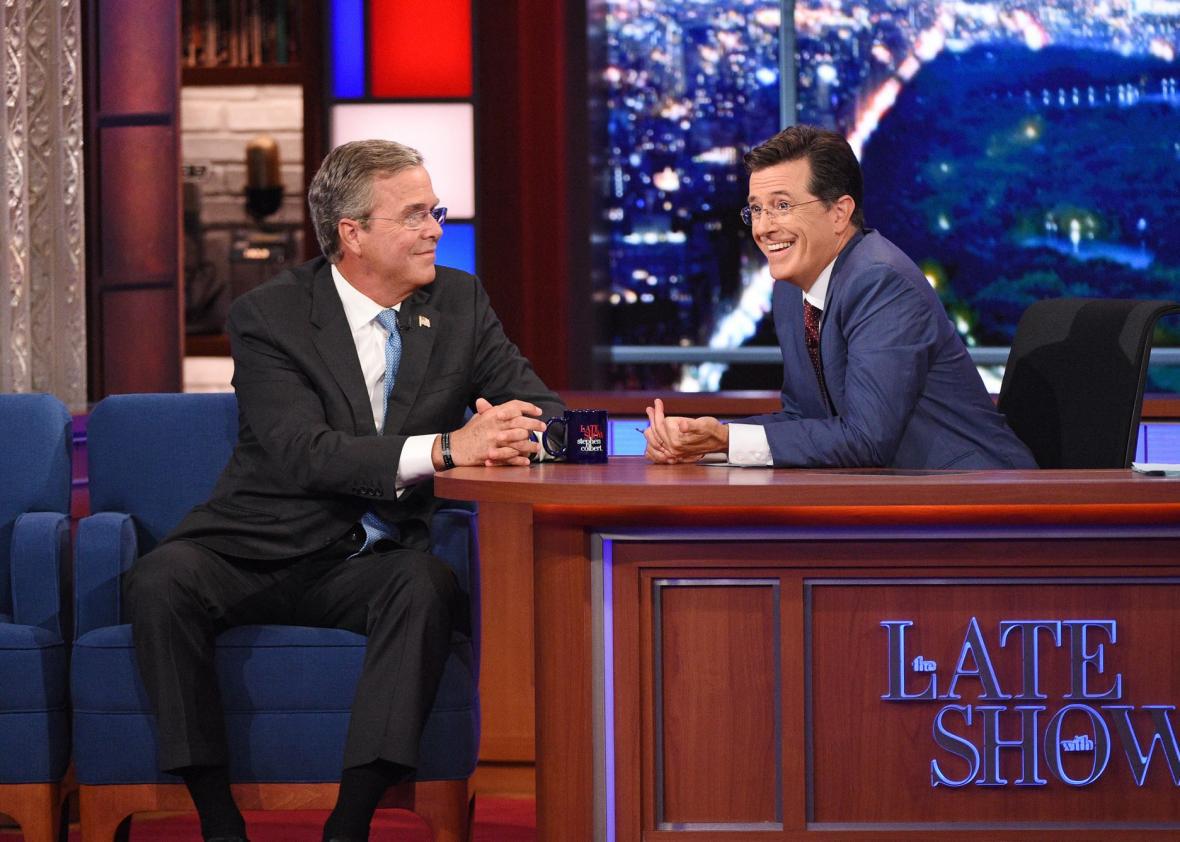Ever since Stephen Colbert announced that he was leaving The Colbert Report to become host of The Late Show, audiences have been wondering who, exactly, would show up to take over for David Letterman. The self-obsessed, conservative savant that Colbert had played for nearly a decade on The Report was not making the transition to CBS. What would Stephen Colbert be like as Stephen Colbert, late night host, and not Stephen Colbert, political demagogue? Could the former really be as entertaining as the latter?
The answers, at least as offered by the first episode of The Late Show with Stephen Colbert, are very promising. Colbert was so ecstatic to be hosting his new show he couldn’t contain his excitement; it kept bubbling over into dance. And yet even in all his jubilation, there was still a bit of archness, a little wink, that trademark schmear of Colbertian irony slathered on every bit of the night. Unlike NBC’s Jimmy Fallon, who made a cameo in the episode, Colbert does not do unfettered earnestness. Unlike ABC’s Jimmy Kimmel, he does not do exasperated jadedness. As Colbert explained to Jeb Bush, who had remarked on all the pictures of Colbert on the Ed Sullivan theater ceiling, “I used to play a narcissistic conservative candidate, now I’m just a narcissist.” The new Colbert is different from the old Colbert, but he is still a part of him. With Colbert there will always be a distance between the performance and the intelligence of the performer, and it’s in that space that the audience is meant to luxuriate.
Late-night is a stodgy format, where a host’s decision to sit, instead of stand, constitutes controversial decision-making. Colbert’s first episode generally stuck to late-night conventions—the monologue, banter from behind a desk, interviews, and band were all present and accounted for—but it tweaked and teased them in heartening ways, especially for a debut. The show looked and felt like late night, but a more wild, antic, theatrical version, especially once Colbert got off his feet and got behind that desk.
Instead of rattling off one-liners about the latest headlines, Colbert took his time on Donald Trump. He treated Trump jokes like Oreo cookies, of which it is impossible to enjoy just one. Colbert’s Trump riff was not Colbert at his most incisive—Donald Trump has been compared to an Oompa-Loompa before—but the segment immediately set Colbert apart from his competition. Colbert can do something the Jimmys can’t: he can act. He can do physical comedy—smashing Oreo after Oreo into his mouth—and he can feign heated emotions, a la the man who just can’t stop telling Trump jokes or smashing Oreos into his mouth. It’s late-night melded with some first-rate theater.
The Trump bit was preceded by something stranger and more original. As Colbert was telling audiences about the memorabilia on set, a growling interrupted him: a horned amulet he had previously pointed out was acting up. Colbert went on to explain that, “in exchange for getting this show, I swore a blood debt… I am enslaved to its drone and must make certain regrettable compromises.” The amulet, in this case, was demanding that he plug Sabra, the night’s sponsor. (Watching, I wondered if Colbert did, in fact, have to do product placement for Sabra, or if he had just wanted to do this oddball segment—which is a sign of very good product placement indeed.) I’m sure some people were perplexed by this bit, but I loved it. It was like a late-night troll doll: shaggy, baggy, odd, adorable only to some people. It was so intentionally weird it underlined the episode’s confidence in itself and its star: Colbert can pull off anything.
The episode’s other highlight was Colbert’s interview with Republican presidential candidate Jeb Bush. It was exactly the sort of high-degree of difficulty interview only Colbert does: substantive and challenging and clever and funny. Colbert thanked Bush for coming, and then began tossing screwballs and fastballs at him. Does Jeb really think he can bring people together? Why is his slogan “Jeb!”? Colbert took his time to gently set up a pointed question about how Jeb differs from his brother, by sharing the ways Colbert differs from his own brother, who was in the audience. As Colbert was flinging out questions, he was also peppering Jeb with hard to parse compliments like “There is a non-zero chance I would vote for you.” It was entertaining and punchy: politicians who are not quick on their feet will probably think twice before appearing on The Late Show.
There were a few missteps. Colbert’s interview with George Clooney was toothless and a bit sycophantic. Colbert will have to figure out a way to be substantive with celebrities without asking them about their charitable work. It’s worthy but it’s invariably boring and makes the host look like a suck-up. In future episodes, Colbert will probably put less food in his mouth: it’s hard to tell jokes around Sabra morsels and Oreo crumbs. And the monologue—the bugaboo of so many late night hosts—didn’t have the distinctive air the rest of the episode did. But Colbert has thousands and thousands of episodes to work out these kinks. One episode in, he’s already bringing something new to late night: himself.
